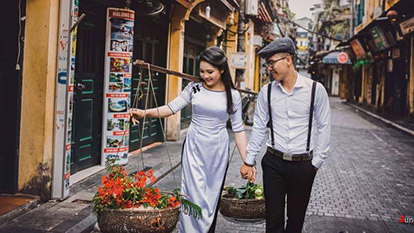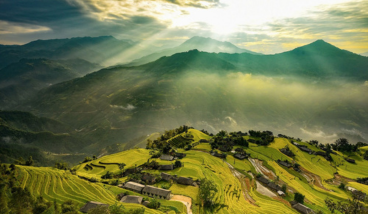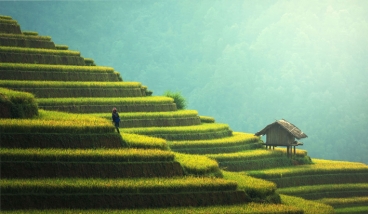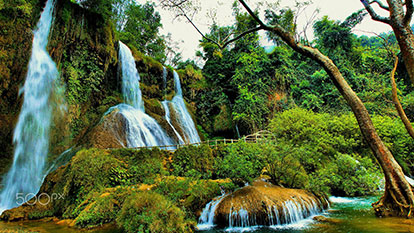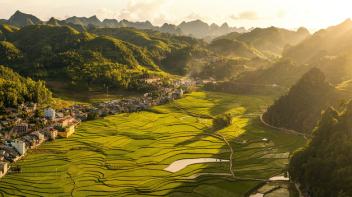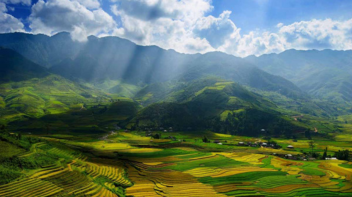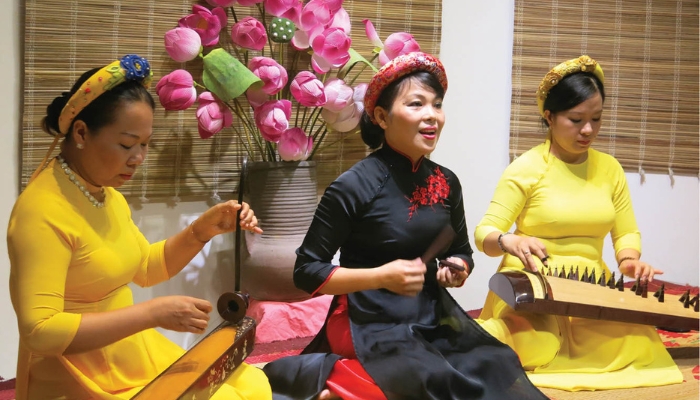Complete travel guide for Ba Be Lake in Bac Kan
Ba Be Lake, located in Bac Kan Province, is one of the most beautiful and famous natural destinations in Northern Vietnam. With its picturesque landscapes, cool climate, and peaceful atmosphere nestled in the heart of mountains and forests, Ba Be attracts an increasing number of domestic and international tourists, especially nature lovers seeking tranquility and a break from the hustle and bustle of city life. What to do in Ba Be? What are the must-see attractions in Ba Be? What should you prepare before going? Follow us, Galatourist, to discover all the practical tips to help you plan and fully enjoy your trip to Ba Be.
I. Overview of Ba Be Lake
Ba Be Lake is located in Nam Mau commune, Ba Be district, Bac Kan province. It is one of the largest natural freshwater lakes in Vietnam. Situated within Ba Be National Park, the site is recognized as one of the top ecotourism destinations in the North of the country, attracting nature and exploration enthusiasts.
About 70 km northwest of Bac Kan city center, Ba Be Lake is formed by three small lakes, Pe Leng, Pe Lu, and Pe Lam - connected by the Nang River. The name “Ba Be,” which literally means “three lakes,” comes from this formation.

Perched at an altitude of 145 meters, Ba Be stretches over more than 8 km in length and up to 3 km in width at its widest point. The lake covers an area of 500 hectares, with an average depth of 20 to 25 meters, reaching up to 35 meters in some places. It is surrounded by majestic limestone mountains and lush primary forests, creating a natural setting that is both grand and poetic.
But Ba Be Lake captivates not only with its scenery. It is also home to a rare and diverse ecosystem: more than 1,000 plant species, 470 animal species, and 106 fish species have been recorded here. Some of these are endangered. The area is also a haven for rare birds such as the beautiful night heron and the rhinoceros hornbill. One can also find an endemic species of climbing bamboo, with slender stalks that drape along the cliffs by the lake, forming natural green curtains of unique beauty.
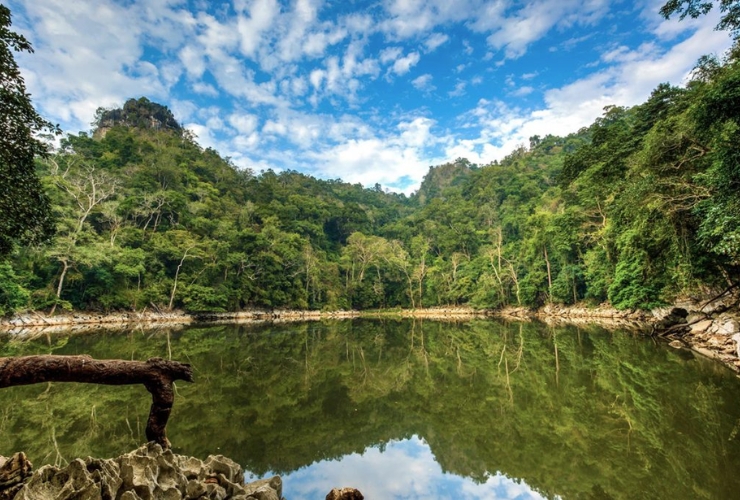
In 1995, Ba Be was listed among the 20 freshwater lakes to be preserved by the World Lake Conference held in the United States. In 1996, the site was recognized as a national historical and cultural heritage site. In 2011, Ba Be Lake became Vietnam’s third Ramsar site.
During your trip to Ba Be, you can also visit the traditional villages along the lakeside, where the Tay, Nung, H’mong, and Dao ethnic groups preserve their customs, crafts, and cuisine. Nicknamed “the green jewel of the Northeast mountains,” Ba Be Lake enchants visitors with both its natural beauty and its rich local culture. It is an ideal stop for those seeking immersion in nature and a discovery of traditional ways of life.
If you are planning a trip to Vietnam and are looking for a peaceful, immersive, and enriching experience, Ba Be certainly deserves a place on your itinerary. So, what to see and do in Ba Be? Find all our tips below to help you organize your trip to Ba Be in the best possible way!
II. Complete travel guide to Ba Be Lake Bac Kan
1. Must-see attractions in Ba Be
1.1. Ba Be Lake and Ba Be National Park
Ba Be National Park, often called the “green lung” of the deep forests of Viet Bac, is a natural complex of rivers, mountains, and lakes nestled within a humid tropical forest ecosystem on karst terrain. It's an ideal destination for nature lovers, explorers, and ecotourism enthusiasts. With its remarkable biodiversity and wild, majestic landscapes, Ba Be National Park remains a must-visit stop on any trip to Bac Kan.
Ba Be Lake is in the center of the national park, surrounded by limestone mountains, caves, and underground springs. With its cool climate all year round and rich flora and fauna, a trip to Ba Be offers a relaxing yet adventurous experience, perfect for those who enjoy slow travel and connecting with nature.
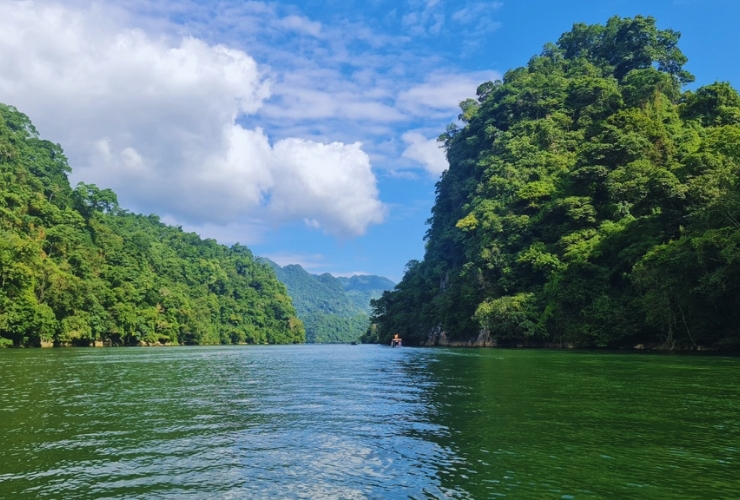
What to do in Ba Be? From the very first moments, exploring this place captivates visitors. Cruising along the Nang River, you’ll be treated to grand views of mountains and forests, spectacular caves, and peaceful rural scenes: water buffalo swimming, rice fields, cornfields, and ethnic villages lining the national park. This unique blend creates an authentic itinerary, rich in natural beauty and local culture.
When visiting Ba Be Lake, you can choose from several navigation options: motorboat, kayak, stand-up paddleboard (SUP), or traditional dugout canoe. Two main piers serve visitors: one at Ba Be and another on the Nang River. Motorboat rental costs range from 10 to 35 euros (for 2 to 8 hours), with a capacity of 10 to 12 people per boat.
Kayaks or SUPs cost around 45 to 56 USD per day for three boats (up to 6 people max). For a more traditional experience, try the dugout canoe, the ancestral means of transport of the Tay ethnic group. Carved from a large tree trunk, each canoe is about 50 cm wide and 5 to 10 meters long, accommodating 2 to 3 people.
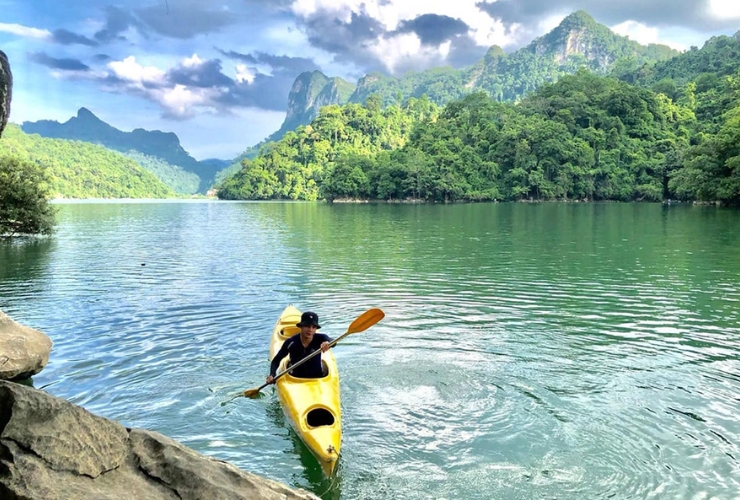
Visiting Ba Be Lake is not only about admiring the wild mountain beauty and the poetic charm of the lake, but also about discovering an extremely rich ecosystem. A tour in Ba Be will take you to over 20 spectacular natural sites, including an impressive network of caves and underground rivers.
To learn more: Ba Be National Park Travel guide
1.2. Fairy Pond (Ao Tien), must-see attractions in Ba Be
What to do in Ba Be? Continue your lake cruise and you’ll arrive at Ao Tien (Fairy Pond), a peaceful little lake nestled in a quiet corner of Ba Be. Covering about 3 hectares, it lies in a valley surrounded by primary forest. Just 100 meters from Ba Be Lake, Fairy Pond is fed by underground springs connected to the main lake and nearby caves, keeping its water full, fresh, and clear year-round.
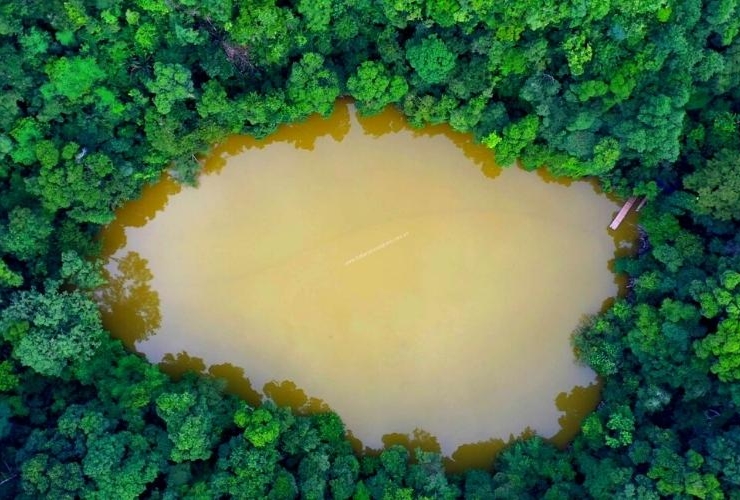
During your trip to Ba Be, you’ll find that the landscape around Fairy Pond is incredibly serene, bordered by limestone mountains and centuries-old trees. Its untouched beauty and subtle mystery naturally attract those who love nature and exploration. The legend of Fairy Pond, passed down through generations by the Tay people, along with mysterious rock engravings, adds even more intrigue and draws curious visitors.
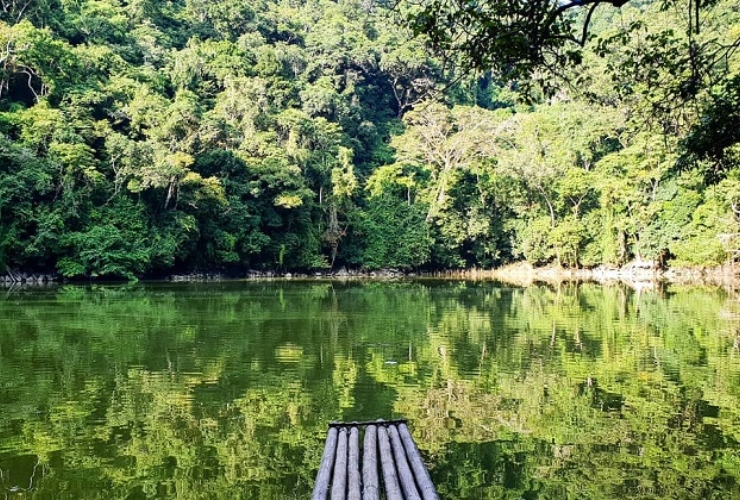
Locals have prepared small rafts to help visitors better enjoy this poetic scenery and capture unforgettable moments in nature. It’s not uncommon to see villagers fishing in the pond, a simple scene that adds authenticity to the trip to Ba Be. These unique moments are among the best answers to the question: What to do in Ba Be?
1.3. Dau Dang waterfall
What to do in Ba Be? Don’t miss Dau Dang Waterfall, one of the iconic sites of Ba Be National Park. Located on the Nang River, at the border of Bac Kan and Tuyen Quang provinces, this impressive Ba Be waterfall stretches over more than 1,000 meters and cascades down three levels, with a drop of 3 to 4 meters between each stage.
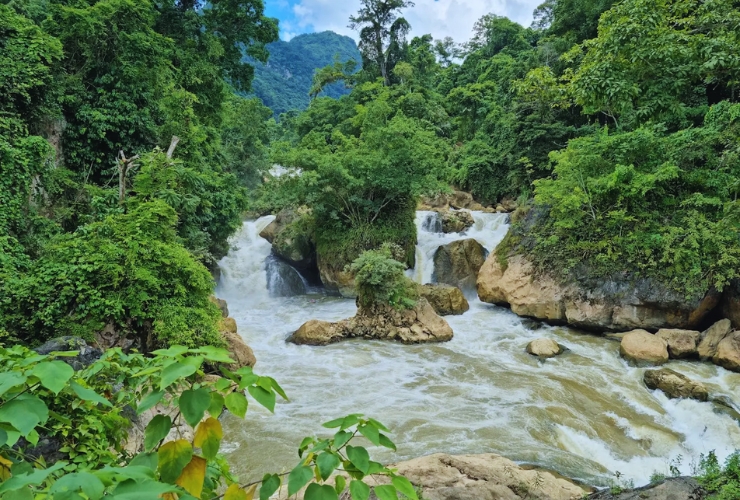
When the Nang River flows through the limestone mountains of Lung Nham, it forms the Puong Cave. Upon reaching Hua Tang Village, its course is obstructed by hundreds of massive rocks, giving rise to the waterfall. What to see in Ba Be? Framed by two steep limestone mountain ranges, Dau Dang Waterfall appears as a natural masterpiece, created by the layering of rocks down a slope of around 500 meters. It forms a spectacular cascade in the heart of the mountains of Northeast Vietnam.
Nestled in a wild natural setting, Dau Dang Waterfall looks like a living painting of nature, enchanting visitors with its majestic, powerful, yet poetic beauty. If you're wondering "What to do in Ba Be?", make sure to visit Dau Dang Waterfall, a true symbol of a journey to Bac Kan.
1.4. Ban Vang Silver waterfall
What to see in Ba Be? Among the must-see attractions in Ba Be is the Silver Waterfall in Ban Vang Village, Hoang Tri Commune, Ba Be District, about 8 km south of Ba Be Lake. Around 40 meters high, the water flows in white sheets from a nearly vertical cliff, like a silky ribbon unfolding in the midst of a lush green forest. It’s the perfect place to relax and cool off in the clear water during hot summer days.
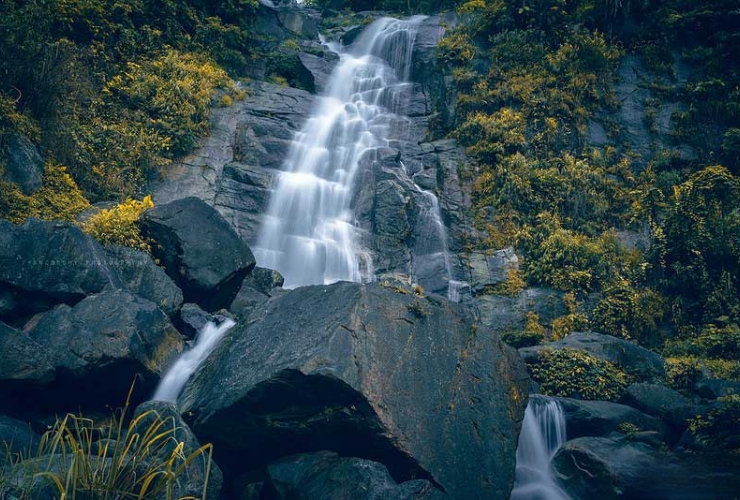
The Silver Waterfall is an essential stop on any Ba Be itinerary. It impresses with its wild, majestic appearance, nestled in the heart of a verdant forest and surrounded by fresh air tinged with floral scents. Far from urban noise, visitors can fully recharge here, embrace the tranquility of nature, and enjoy a moment of absolute peace. An unforgettable experience during a trip to Ba Be.
1.5. Puong Cave
Located in Ba Be National Park, Puong Cave is an impressive natural tunnel carved through limestone by the Nang River, offering a grandiose spectacle typical of Northern Vietnam. Approximately 300 meters long, Puong Cave is a highlight not to be missed during your visit to Ba Be.
What to do in Ba Be? Take a boat ride through Puong Cave, immerse yourself in the untouched mountain atmosphere, and discover a fascinating ecosystem. It’s one of the best things to do at Ba Be Lake.
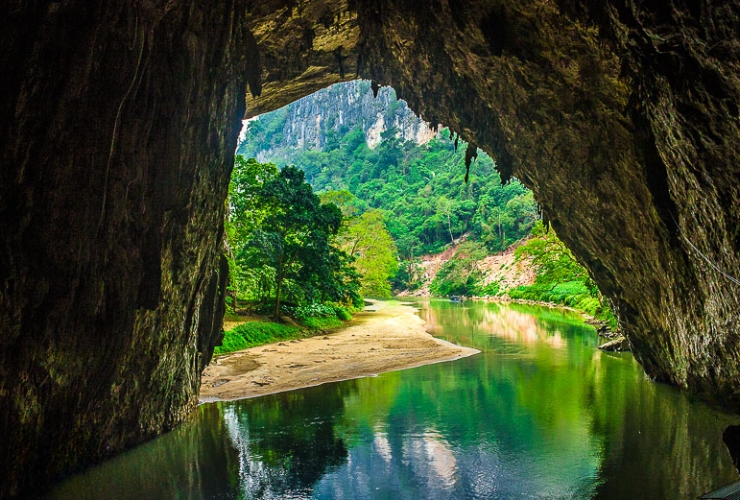
Visiting Ba Be Lake, as the boat glides gently over the turquoise water, you can admire the rocky columns and stalactites hanging from the cave ceiling, reflecting light in a thousand sparkling rays. The deeper you go into the cave, the more you’ll spot thousands of bats hanging from the ceiling, adding to the mysterious and wild ambiance of this unique place.
If you're planning a tour in Bac Kan, don’t forget to include Puong Cave in your Ba Be itinerary. It’s one of the standout destinations, offering a stunning and immersive experience in the majestic nature of Northeast Vietnam.
To go deeper : What to see in Puong Cave?
1.6. Hua Ma Cave
What to do in Ba Be? Located within Ba Be National Park, Hua Ma Cave (also known as Leo Pen) is one of the most stunning caves in Bac Kan, known for its majestic beauty and its mystical, sacred atmosphere. Nestled deep inside the mountain, it fascinates visitors with its unique stalactites and stalagmites.
During your trip to Ba Be, reaching the cave entrance requires a 300-meter walk up solid stairs built from the foot of Co Don Mountain. The entrance is about 5 meters high and 3 meters wide. At the doorway, visitors are greeted by the inscription: “Hua Ma, the number one cave marvel.” From here, you can admire the mountainous landscape, green rice fields, and the peaceful Leng River winding below.
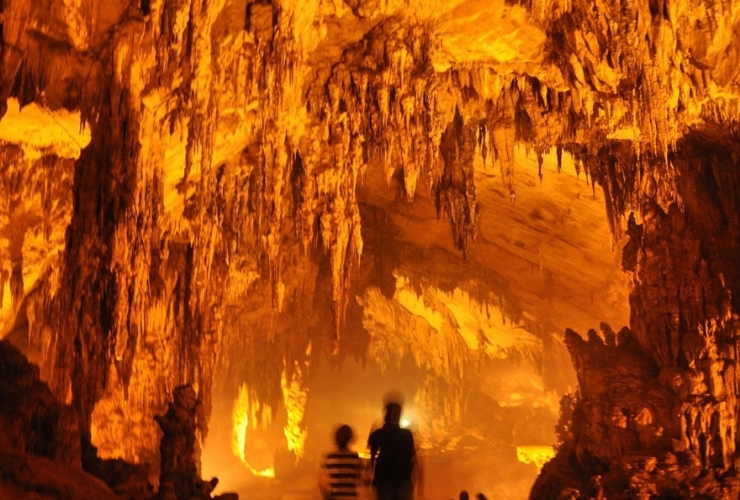
As soon as you step inside Hua Ma Cave, you’ll feel a refreshing drop in temperature - like natural air conditioning. What to see in Ba Be? Inside, every rock wall and majestic stalagmite sparkles, forming shapes that resemble a brush-shaped tower, a lotus flower, or even scenes from the legend of Master Tang Sanzang and his disciples on their sacred journey. It’s a fairytale-like spectacle of nature.
The cave is remarkably spacious, covering around 1 hectare, with a vault reaching 10 meters in height and a depth of up to 500 meters, offering a cool, airy atmosphere. Along the trail, a clear underground stream flows gently through the silence, enhancing the cave’s mysterious charm. Small chambers lead to wider areas, perfect for exploration and photography.
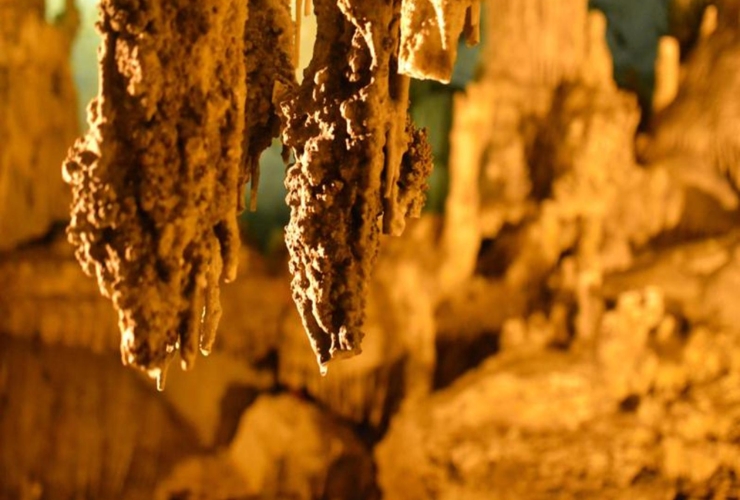
What to do in Ba Be? Don’t miss a visit to Hua Ma Cave and its fascinating legends. According to locals, the cave was once haunted by restless spirits. An imperial general passing through heard ghostly cries echoing from within. He held a ritual sacrifice of a horse’s head, and from then on, peace returned to the cave. With its raw natural beauty, mysterious tales, and sacred atmosphere, Hua Ma Cave is a must-visit on any Ba Be itinerary.
1.7. Ba Goa Island
During your trip to Ba Be, don’t miss Ba Goa Island, a small islet in the heart of Pe Leng Lake tied to a legendary tale of Ba Be. This island is not just a scenic spot but also a cultural symbol, passed down through generations of local residents.
From afar, Ba Goa Island looks like a miniature garden floating on the deep blue waters. Also known as Po Gia Mai, the island is formed by large overlapping stones, with tree roots anchored deep into the rocky slopes. Despite years of rain, wind, and storms, it stands proudly in the middle of the lake, a powerful symbol of nature’s resilience and raw beauty in Bac Kan.
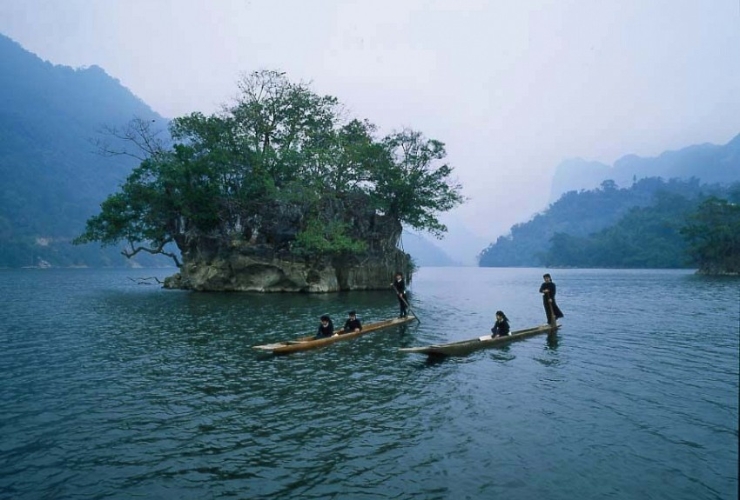
What to do in Ba Be? Take time to visit the small temple dedicated to the spirit of the lake, where locals regularly come to light incense and pray for good harvests and favorable weather. From this tiny island, you can enjoy panoramic views of Ba Be, surrounded by steep limestone mountains and lush primeval forests. It’s the perfect place to pause and unwind in the serenity of nature during your Ba Be tour.
What to see in Ba Be? Make sure to visit Ba Goa Island in the late afternoon, the ideal moment to catch the sunset painting the sky in deep purples. You might even catch sight of a young Tay woman rowing her dugout canoe past the island, like a living watercolor painting. With its mix of legend and natural beauty, Ba Goa Island is an essential stop on any Bac Kan tour.
1.8. Pac Ngoi Village
During your trip to Ba Be, a visit to Pac Ngoi Village, also known as the Pac Ngoi Cultural Tourism Site (in Nam Mau commune, Ba Be district), is one of the best things to do in Ba Be, especially for those interested in local culture and authentic highland life.
Located along the Leng River and the edge of Ba Be Lake, Pac Ngoi Village is a long-established settlement of the Tay ethnic group. With around 50 traditional stilt houses, the village sits peacefully beneath a canopy of lush green forest. Most of the homestays in Bac Kan are concentrated here, making it the perfect place to enjoy a peaceful environment and connect with nature.
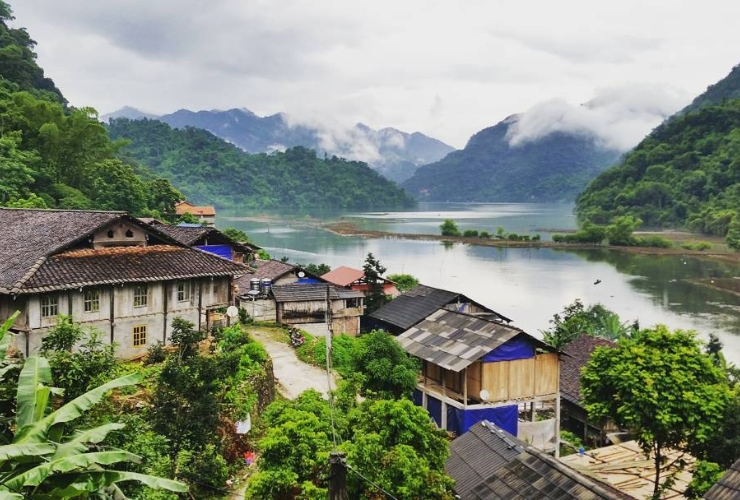
What to do in Ba Be? A visit to Pac Ngoi offers a unique opportunity to experience the daily life and culture of the Tay people. They primarily live off farming, livestock, and fishing in Ba Be. More specifically, during a visit to Ba Be Lake, at Pac Ngoi, travelers can savor delicious local specialties infused with mountain flavors, such as sticky rice cooked in bamboo tubes (cơm lam), grilled fish with fermented meat, five-colored sticky rice (xôi ngũ sắc), and take part in activities like fishing or paddling a traditional dugout canoe.
In the evening, visitors can enjoy traditional Then singinga traditional string instrument (đàn tính), or join in lively folk dances with the villagers. These are more than just performances, they offer a deeper insight into the region's strong community spirit and enduring cultural traditions.
Wondering what to do in Ba Be? Pac Ngoi Village is the perfect blend of relaxation and cultural immersion. This top tourist site in Ba Be stands out for its natural charm, but also for the warmth, simplicity, and rich traditions of the Tay people in the Bac Kan mountains.
2. Things to do in Ba Be
2.1. Discover local culture
Ba Be is not only famous for its stunning natural beauty but also for the rich cultural diversity and vibrant community life of its local people. This region is home to over 3,000 residents belonging to the Tay, Dao, H’Mong, and Kinh ethnic groups, with the Tay making up the majority. By joining a Ba Be tour, visitors can stay in homestays in villages like Pac Ngoi, Bo Lu, or Coc Toc to experience daily life, taste authentic ethnic cuisine, and connect with locals.

What to do in Ba Be? Don’t miss exploring the cultural lifestyle of the local ethnic minorities. The Tay people are renowned for their brocade weaving craftsmanship, folk music, especially their traditional string instrument called the đàn tính, and the Then singing style.
The H’Mong and Dao communities, who share linguistic roots, have many cultural similarities that add to Bac Kan’s unique tourism appeal. These groups live in high mountain areas, practice agriculture, and build their houses directly on the ground. Though the H’Mong lifestyle is more isolated compared to other ethnicities, their strong community spirit preserves many traditional values.
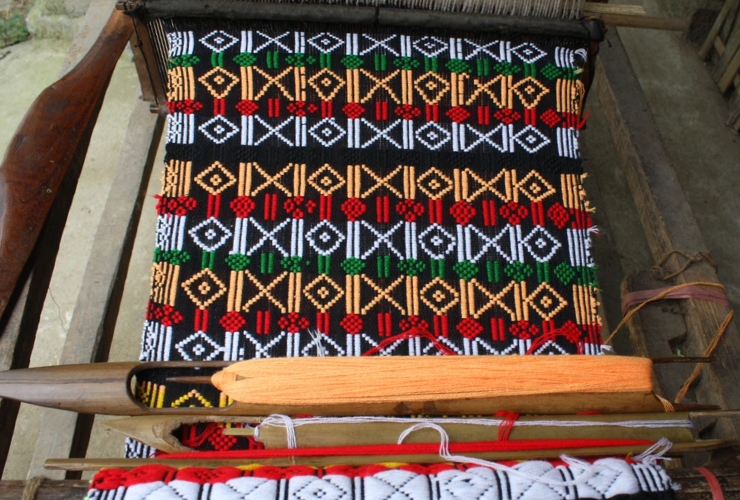
Choosing a Bac Kan tour to Ba Be means more than just admiring natural landscapes, you immerse yourself in a rich ethnic culture typical of the highlands.
2.2. Explore traditional villages around Ba Be
What to do in Ba Be? Among the must-see tourist sites, traditional villages with strong cultural identities are a highlight. When visiting Ba Be Lake, you’ll have the chance to discover the lifestyles and customs of the Tay, H’Mong, and Dao peoples who have lived around the lake for generations. Some key villages showcasing local culture and offering unique experiences not to be missed on a Ba Be tour include:
- Tay villages: Pac Ngoi, Bo Lu, Coc Toc, Cam Ha, Vang (all in Hoang Tri commune).
- H’Mong and Dao villages: Khau Qua (H’Mong), Nam Dai (Dao), Na Nghe (Dao), and Dan May (H’Mong and Dao).
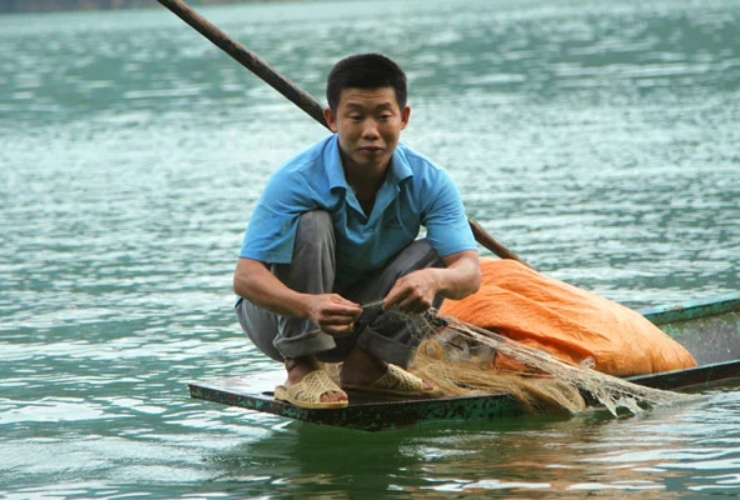
During a trip to Ba Be, tourists can stay in local homestays, take part in ethnic festivals, savor traditional dishes, hike through forests, or paddle in traditional dugout canoes on Ba Be Lake. Exploring these villages is a vital part of any Bac Kan tour, offering a deeper understanding of the region’s natural beauty and cultural richness. While visiting, remember to respect local customs and help protect the environment to make your trip to Ba Be even more meaningful and rewarding.
2.3. Experience cultural festivals
What to do in Ba Be? Beyond admiring the stunning natural landscapes, visitors to Ba Be can immerse themselves in the unique cultural festivals of the mountain ethnic groups in Bac Kan. The most notable is the Ba Be Spring Festival held early in the year. This event features a ceremony to pray for rain and good weather, alongside lively traditional games such as dugout canoe races, tug-of-war, stick-pushing contests, and bull wrestling. This festival is a cultural highlight and a must-see during a spring visit to Ba Be Lake.
Another important event is the Long Tong Festival, or the "field descent," celebrated by the Tay and Nung people in Bac Kan. Marking the start of the new agricultural season, it includes rituals thanking the spirits, lion dance competitions, ball throwing, stilt walking, and crossbow shooting. Visiting Ba Be in spring offers a perfect chance to witness and engage with this vibrant cultural celebration.
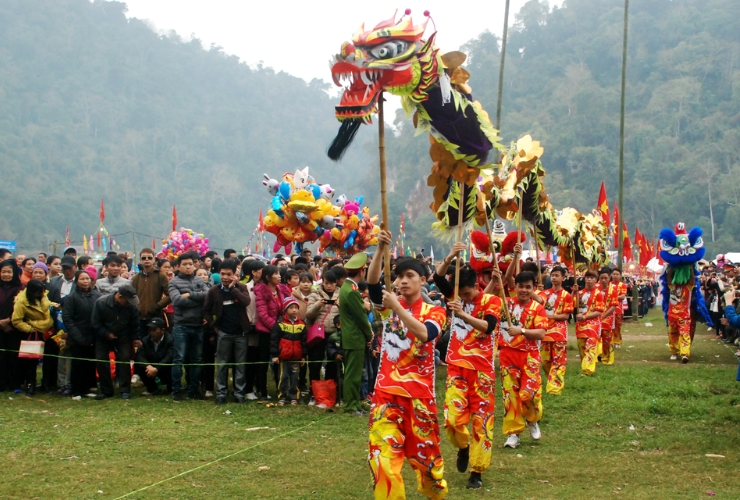
In addition, Bac Kan tourism also takes you to the Mu La Festival of the H’Mong people in Co Linh commune, Pac Nam district. This ceremony expresses gratitude to the sky and earth for a good harvest and also serves as a social gathering where young men and women meet and form couples. The Dao ethnic group’s unique initiation ceremony, marking young men’s transition into adulthood, is another fascinating tradition.
So, what to do in Ba Be? By joining a Bac Kan tour, visitors don’t just enjoy majestic nature but deeply experience the traditional cultural values rooted in the identity of the highlands.
3. How to get to Ba Be Lake, Bac Kan
Ba Be Lake is located in Bac Kan Province, about 165 km from Hanoi. It’s one of the top tourist destinations attracting lovers of nature and local culture. Choosing the right mode of transport is key to making your trip comfortable and complete.
From Hanoi, travelers have two main routes to Ba Be. The first follows the old National Route 3, taking about 3 hours, suitable for both cars and motorcycles. The second, faster route uses the Hanoi - Thai Nguyen highway, then National Route 3, taking around 2 hours, but this is accessible only by car.
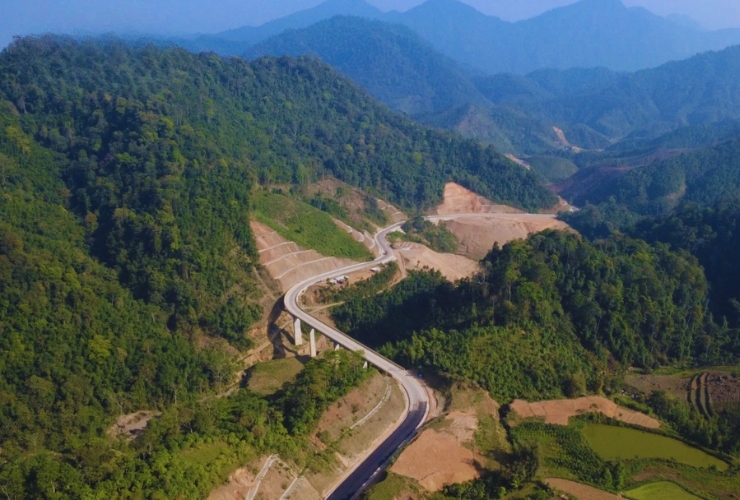
From Bac Kan city center, two main roads lead to Ba Be Lake. The first is Provincial Road 256, about 60 km long. The other follows Provincial Road 257 to Cho Don, then continues to Ba Be, totaling approximately 70 km. Both routes are practical and commonly used for tours to Ba Be.
How to get to Ba Be Lake? If you prefer to use public transportation, you can take a bus from My Dinh Bus Station (Hanoi). Lines serving Bac Kan or Cao Bang usually pass through the Ba Be tourist area, which is very convenient for visitors.
For travelers coming from Ho Chi Minh City or the southern provinces, the best way to join a Bac Kan tour is to fly to Hanoi and then continue along the itinerary mentioned above. Thanks to a well-developed road network, exploring Bac Kan or sites like Ba Be has never been easier.
Take a look at: What to do in Ba Be in 1 day?
4. Best time to visit Ba Be Lake
Each season at Ba Be offers its own unique beauty, providing visitors with unforgettable experiences. You can plan your trip to Ba Be Lake based on your preferences, but choosing the best time to visit is essential to fully enjoy your stay. So, when to visit Ba Be? Spring and autumn are considered the perfect seasons for a Ba Be tour. During these periods, the weather is pleasant and the landscapes are stunning, making outdoor activities more enjoyable.
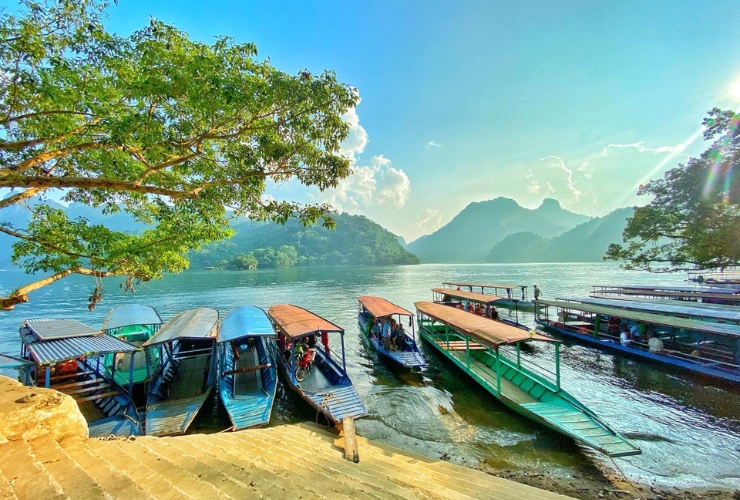
Spring, from March to May, is the best time to visit Ba Be Lake. Temperatures range from 20 to 25°C, ideal for boat rides, hiking in Ba Be National Park, and exploring the iconic spots around the lake. Nature is vibrant and full of life, captivating every traveler.
Additionally, Ba Be in spring hosts the traditional Long Tong Festival, a cultural experience unique to Bac Kan that you shouldn’t miss.
In autumn, from September to November, Ba Be Lake becomes more enchanting than ever. The cool and comfortable temperatures, between 18 to 23°C, make exploring the forests and cruising on the lake especially enjoyable. The autumn scenery at Ba Be will surely leave you amazed.
5. What to eat in Ba Be?
Ba Be is home to five different ethnic groups, each with its own unique culinary culture. This diversity creates a rich and authentic gastronomy. So, during your trip to Ba Be, besides enjoying the breathtaking natural scenery, you definitely shouldn’t miss tasting the local specialties. Let’s explore some must-try Ba Be specialty, an essential part of your travel experience!
- Grilled fish from Pac Ngoi: The fish are freshly caught from Ba Be Lake, cleaned, and grilled over charcoal fire. Their white, firm flesh is flavorful and aromatic. Visitors can also try grilled shrimp or frog - rustic and typical dishes that you absolutely have to taste during a Ba Be tour.

- Fermented shrimp: Fresh shrimp from the lake are mixed with fermented rice, galangal, rice bran, and various spices, then left to ferment for a long time. This process gives the shrimp a tangy taste and a soft texture that’s very distinctive. This Ba Be specialty is mainly sold in the villages of Bo Lu and Pac Ngoi and is one of the most beloved dishes during a trip to Ba Be.
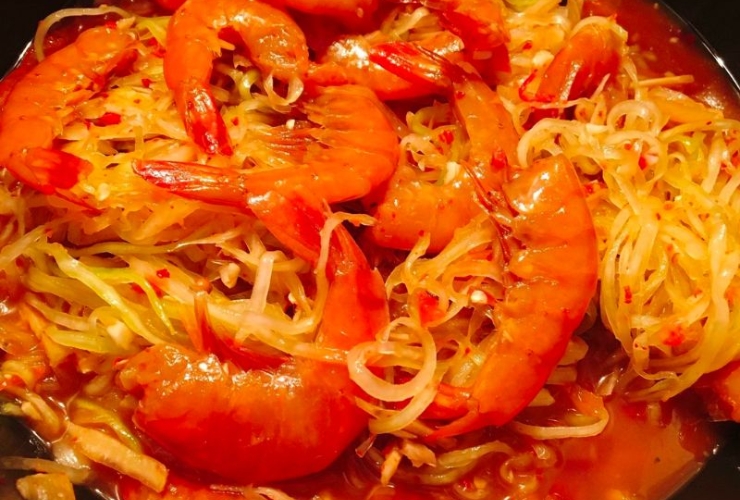
- Smoked pork: What to eat at Ba Be? Don’t miss the famous smoked pork, a traditional Tay specialty. The meat is hung above the hearth inside homes and slowly smoked over wood fire. This method gives the meat a dark brown-black color and allows it to be preserved for months, even up to a year. Today, it remains a must-have dish for festivals, ceremonies, or special visits.

- Smoked sausages: The meat is minced, seasoned with spices typical of the mountainous region, then stuffed into casings. The sausages are then hung above the fire to be smoked. With their savory and aromatic flavor, they are popular as delicious culinary souvenirs on any Ba Be tour.
- Mountain sticky rice: This Ba Be specialty is carefully prepared. The rice grains are soaked, then steamed in a traditional wooden basket. The rice is tender, fragrant, doesn’t stick to the fingers, and is usually eaten with roasted pork, creating a remarkable flavor combination. If you wonder what to eat in Ba Be, mountain sticky rice is a must for any food lover looking for a memorable culinary experience.
- Sticky rice cake with mugwort leaves: This dark green cake owes its color to mugwort leaves and is wrapped in banana leaves with a filling of sugar, peanuts, and sesame. Although its shape resembles sticky rice cakes from the delta, its preparation requires great care, from selecting the rice to pounding it. This Ba Be specialty is a must-try to discover the flavors of the Ba Be mountains.
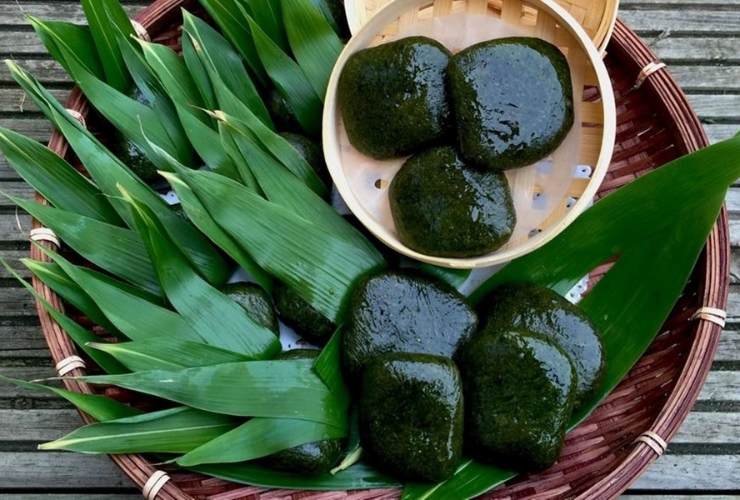
- Heaven cake: Another traditional Tay cake, round in shape, coated with white powder, and filled with a mildly sweet filling. Once reserved for New Year celebrations, this Ba Be specialty is now offered year-round to travelers visiting Ba Be.
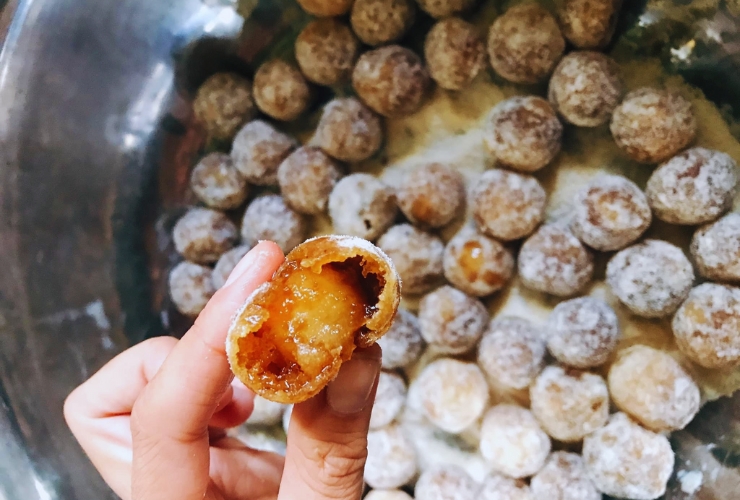
What to eat in Ba Be? Visitors can also enjoy a variety of wild vegetables like banana flowers, rau bo khai, rau ngot rung, and dried mac mat fruits. All of these are best accompanied by fermented corn liquor infused with leaves, a typical local drink not to be missed during your trip to Ba Be.
6. Where to stay in Ba Be?
To properly plan your trip to Ba Be, choosing the right accommodation is essential, as it contributes to a successful travel experience. Visitors have several options, including comfortable hotels, eco-lodges, or homestays located near the lake. Here are some useful tips to help you chooseyour accommodation in Ba Be.
If you're wondering "Where to stay in Ba Be?", a homestay is the ideal option during your trip to Ba Be. Most of these accommodations are located close to the Ba Be Lake, making it easy to get around, while also allowing visitors to immerse themselves in local life, enjoy traditional cuisine, and explore the mountain culture.
Here are some well-rated homestays in Ba Be you might consider for your stay:
| 1. Son Lam Homestay |
|
| 2. Duy Tuyen Ba Be Homestay |
|
| 3. Anh Duoc Homestay |
|
| 4. Hoang Nguyen Homestay Ba Be |
|
| 5. Huyenhao Homestay |
|
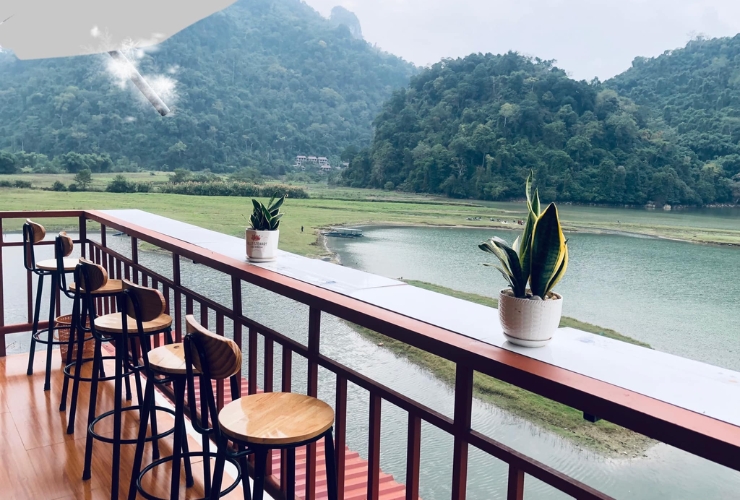
In addition to homestays, travelers can also consider other accommodation options such as:
Ba Be Legend Hotel - 3-star hotel
- Address: Na Mam, Ba Be, Bac Kan
- Google Maps rating: 4.7/5
Ba Be Retreat - Ecolodge
- Address: Ban Cam Hamlet, Nam Mau, Ba Be, Bac Kan
- Google Maps rating: 4.7/5
What to do in Ba Be? What to eat in Ba Be? And where to stay in Ba Be? All the answers can be found in our travel guide to Ba Be Lake in Bac Kan. We hope this information will help you organize your next trip to Ba Be with ease. Whether you’re going for a weekend getaway or a longer trip, Ba Be promises unique moments of relaxation in the heart of nature. Don’t forget to save this article and contact us, Galatouriste - a travel agency in Vietnam, for more tips or to book a Ba Be tour, making your visit to Bac Kan easier and more complete than ever!
Refer to:
Sincerely yours & see you soon!
GALATOURIST since 2005.
Testimonials

Ms. Francesca Tronconi & Mr Vizzolini Davide (2pax) from Spain

Mrs & Mr. DUPUIS (2pax) from United States

Mr. Jeffrey Szymanski (2pax) from United States

Mrs Rosemary McGuinness (2pax) from Australia

Mrs Elena Maria Sanchez (2pax) from Spain

Group Marissa (4pax) from United States

Mr Jerzy (2pax) from Canada






